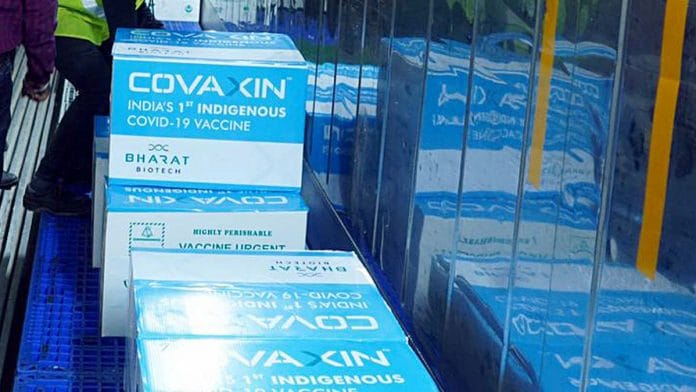New Delhi: Scientists at ICMR’s National Institute of Virology (NIV) and Bharat Biotech have released a pre-print, non-peer-reviewed paper, which has found that when tested in a lab, neutralising antibodies produced by Covaxin have the ability to combat the mutant UK strain of the coronavirus.
Among the foremost concerns around the UK strain is that vaccines may not be able to perform as efficiently because of the mutations on the virus’ surface.
“A comparable neutralization activity of the vaccinated individuals sera showed against UK-variant and the heterologous strain with similar efficiency, dispel the uncertainty of possible neutralization escape,” says the paper, which was released on 26 January on the non-peer-reviewed site biorxiv.
Bharat Biotech’s Covaxin was under the scanner earlier this year when it was given emergency use authorisation though it had not released any efficacy or phase three data.
Indian Council for Medical Research (ICMR) chief Balram Bhargava defended the approval in early January, saying Covaxin was more likely to protect against the UK strain, though there was no publicly released data to support the claim at the time.
Tested in lab
The UK variant has 17 mutations, eight of which are found in the spike protein.
“Therefore, it appeared that the majority of the vaccine candidates, being either recombinant or specifically targeting the single epitope of original D614G ancestral spike sequence, might not be able to generate an efficient immune response against the new variants,” reads the paper.
Bharat Biotech’s Covaxin, on the other hand, is made of a whole inactivated virus, and is not based solely on the spike protein.
The experiment was conducted in a laboratory, using the sera of 26 trial participants who had been vaccinated with Covaxin. Serum is a component of blood that includes antibodies, which are used to fight the virus.
The antibodies of the vaccinated trial participants were used against three strains of the Covid-19 virus for the experiment — hCoV19/India/2020770, which was used by the NIV for the development of Covaxin, hCoV-19/India/2020Q111, a local strain that has been circulating in India, and the hCoV-19/India/20203522, the mutant UK strain.
“The median ratio of 50% neutralization of sera was found to be 0.8 when compared with hCoV-19/India/2020770 against mutant hCoV19/India/20203522 (UK strain), and 0.9 while compared with hCoV-19/India/2020Q111,” reads the paper.
“Our study evidently highlighted comparable neutralization activity of vaccinated individuals sera against variant as well as heterologous SARS-CoV-2 strains,” it adds. “Importantly, sera from the vaccine recipients could neutralise the UK variant strains discounting the uncertainty around potential escape.”
The scientists concluded that it is “unlikely” the UK variant will “dampen the potential benefits of the vaccine in concern”.
Also read: 17% Indians in 30-69 age group may not be able to take Covaxin as they’re on blood thinner






